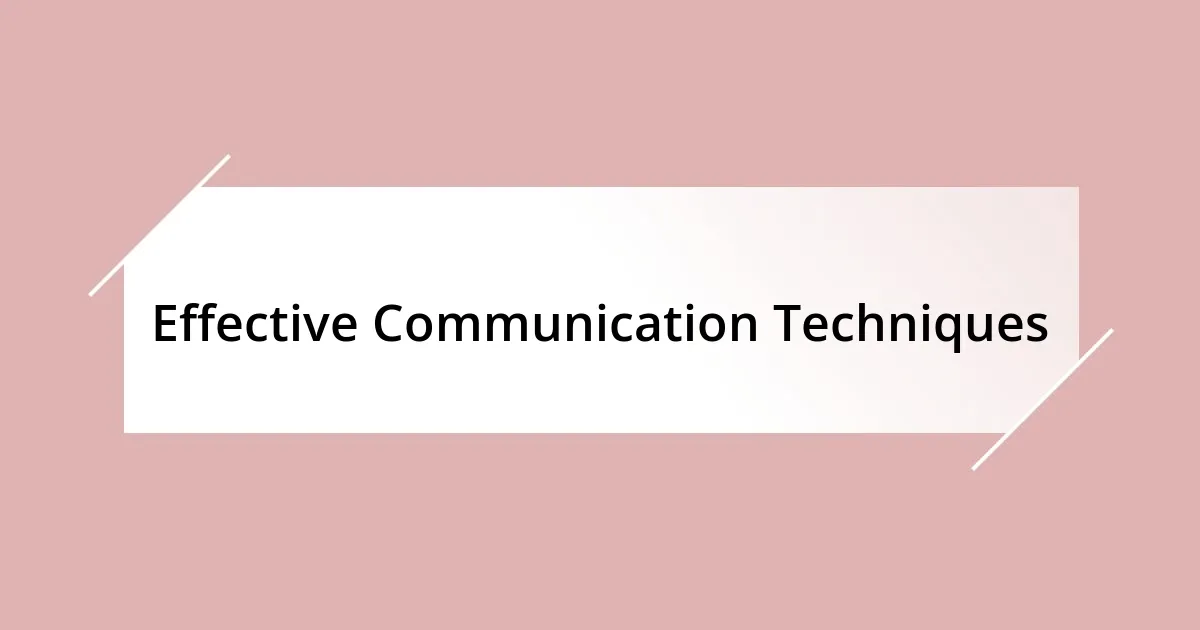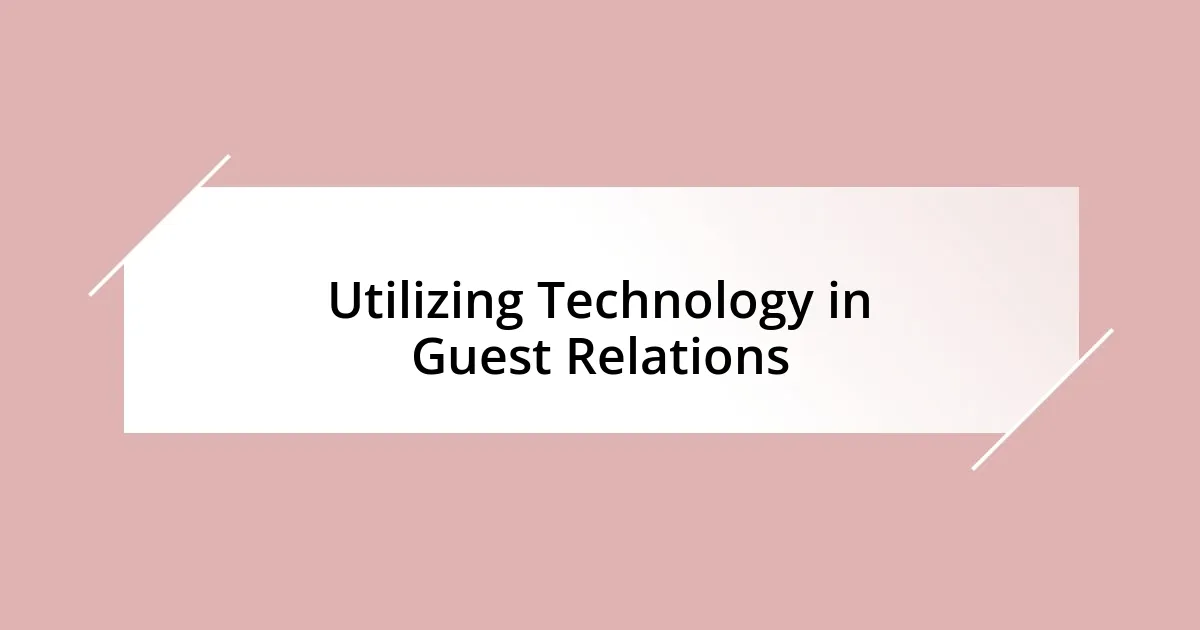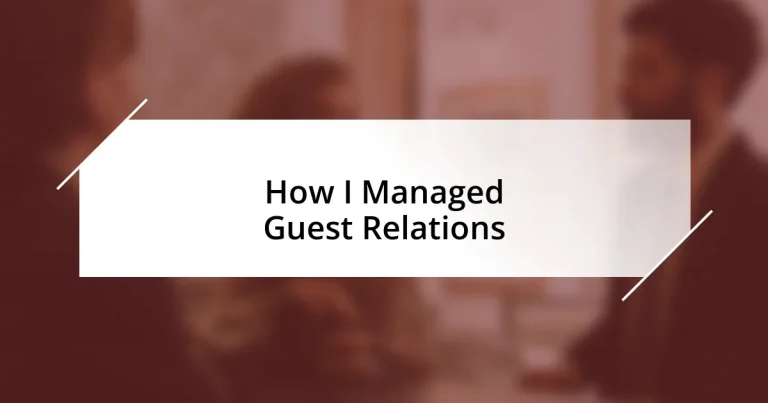Key takeaways:
- Empathy and active listening turn negative experiences into opportunities for connection and loyalty.
- Personalization of guest experiences through thoughtful gestures significantly enhances satisfaction and creates lasting memories.
- Utilizing technology, such as chatbots and customization apps, optimizes guest interactions and promotes engagement.
- Regular feedback collection and responsiveness to concerns foster trust and improve overall service quality.

Understanding Guest Relations Strategy
Understanding guest relations strategy is about building genuine connections with visitors. I remember a time when a guest expressed frustration due to a booking error. Instead of just offering an apology, I took the time to listen and understand their feelings, which turned a negative experience into an opportunity for deeper engagement. Isn’t it amazing how a simple act of empathy can transform a situation?
One key aspect of a successful guest relations strategy is anticipating needs before they become issues. When I was managing a hotel, I noticed guests often struggled to find local dining options. So, I created a personalized dining guide based on their preferences and handed it out upon check-in. This not only delighted them but also showed I had taken the time to understand their interests. How much more fulfilling is it to see a guest smile because you’ve met their needs in advance?
Effective communication is the backbone of any guest relations strategy. There was a time when I implemented follow-up calls after a guest’s departure to gather feedback and discuss their experience. Many guests appreciated this gesture, feeling valued long after their stay. Isn’t it rewarding to invest in relationships that go beyond a single interaction?

Building Strong Guest Relationships
Building strong guest relationships hinges on the power of personalization. One memorable experience I had was when a family visited our hotel to celebrate a reunion. I reached out in advance to understand their plans and arranged a surprise welcome with local treats and a personalized note acknowledging their special occasion. The look of joy on their faces was priceless; it reminded me that thoughtful gestures can create lasting memories.
Here are some strategies that have worked wonders for me:
- Active Listening: Always give guests your full attention. When they feel heard, they feel valued.
- Follow-Up: A quick email or call after their stay shows that you genuinely care about their experience.
- Personal Touches: Small surprises, like a handwritten thank-you note, can make a big difference.
- Feedback Loop: Regularly ask guests for their opinions. It not only improves your service but builds trust.
Noticing these simple actions in guest interactions has truly changed how I approach building relationships. It’s about making every guest feel like they matter, and those connections often lead to loyal repeat guests over time.

Effective Communication Techniques
Effective communication is essential when managing guest relations. I’ve found that asking open-ended questions can encourage guests to express their thoughts. For instance, during a feedback session, I asked a guest what aspects of their stay stood out the most. To my surprise, this led to a deeper conversation about their experiences, and I was able to address minor concerns they hadn’t initially voiced. Genuinely engaging with guests opens the door to understanding their expectations better.
When it comes to communication techniques, clarity is key. I remember a time when I had to explain a policy change regarding late check-outs to my guests. Instead of just listing the changes, I took the time to highlight the benefits this would bring them, like improved room availability and enhanced service. By making the information relatable, I noticed a positive reaction; guests were much more willing to embrace the new policy and felt informed rather than frustrated. Isn’t it interesting how a little clarity can foster trust?
Moreover, body language can dramatically affect communication. I always make an effort to maintain eye contact and use open gestures when speaking with guests. During a busy check-in period, I noticed a guest feeling anxious due to the crowd. A smile and a reassuring nod while attending to them helped ease their worries. It’s remarkable how non-verbal cues can enhance the guest experience and create a welcoming atmosphere.
| Technique | Description |
|---|---|
| Active Listening | Giving full attention and validating guests’ feelings to foster trust. |
| Clarity | Explaining policies and procedures clearly to avoid confusion and build confidence. |
| Open-Ended Questions | Encouraging guests to share more about their experiences for better understanding. |
| Positive Body Language | Using gestures and facial expressions to create a welcoming environment. |

Handling Guest Complaints Successfully
When a guest shared a complaint about a noisy room during a recent stay, I knew the importance of addressing it immediately. Rather than making excuses, I empathized with their frustration, saying, “I completely understand how disruptive that must have been for you.” This simple connection opened a dialogue, allowing the guest to feel recognized and valued. It’s remarkable how just a few empathetic words can transform a complaint into an opportunity for connection.
On another occasion, a couple expressed disappointment about the limited options in the restaurant. Instead of brushing off their concern, I asked what types of cuisine they enjoyed. Their faces brightened as they shared their preferences, and I promised to relay their feedback to the chef. The couple left feeling heard and appreciated, which made me reflect: how often do we overlook the chance to create a better experience through genuine engagement?
Sometimes, the follow-up is where the real magic happens. After resolving a guest’s complaint about the cleanliness of their room, I made it a point to reach out a few days later. I simply asked, “How did everything go after our chat?” Their response was overwhelmingly positive; they felt that I genuinely cared about their experience. Isn’t it fascinating how a small gesture of follow-up can elevate a service from merely satisfactory to truly outstanding?

Personalizing Guest Experiences
Personalizing guest experiences is all about understanding individual preferences. For instance, I once encountered a family celebrating a milestone birthday during their stay. I took the initiative to surprise them with a small cake and a handwritten note from the staff. Their delighted reactions reminded me how a thoughtful gesture can turn a regular visit into a cherished memory. It’s moments like these that truly highlight the importance of personalization.
I’ve often found that paying attention to details can make all the difference. One time, I noticed that a frequent guest always requested herbal tea. So, during their next visit, I had a selection of their favorite teas waiting in the room. The sheer joy on their face was priceless. It made me think: how often do we overlook the opportunity to create a connection through something as simple as a preferred beverage?
Engaging with guests on a personal level can also be incredibly rewarding. I remember chatting with a solo traveler about their journey and discovering their passion for photography. I suggested some local spots ideal for their hobby and even arranged for an early breakfast to accommodate their photography schedule. Seeing their excitement as they left gave me a warm feeling, reminding me that the best experiences are shaped not just by service, but by genuine connections.

Utilizing Technology in Guest Relations
Utilizing technology in guest relations has completely transformed how I interact with guests. For example, I once implemented a chatbot on our hotel website that provided instant answers to common queries. The first time I witnessed it in action, I felt a surge of satisfaction as I realized it freed up my time to focus on more meaningful guest interactions, allowing me to be present for those heartfelt conversations that truly matter.
On another occasion, I experimented with an app that enabled guests to customize their room settings—like temperature and lighting—before even arriving. When one guest checked in and thanked me, saying, “I was so excited to walk into my perfect room!” I felt a wave of affirmation. I couldn’t help but wonder: how often do we overlook the power of technology to create those “wow” moments?
As I reflect on how social media influences guest relations, I’ve noticed its potential goes beyond mere marketing. I once engaged with a guest who shared a beautiful photo of our hotel on Instagram. I commented on their post, thanking them and inviting them back with a special rate. It struck me then how digital platforms can nurture relationships, turning guests into loyal advocates—could this be the future of hospitality?

Measuring Guest Satisfaction and Feedback
Measuring guest satisfaction is crucial for improving the overall experience. I once initiated a post-stay survey that included open-ended questions, allowing guests to express their thoughts freely. Reading through their responses felt like peering into a treasure chest—each insight illuminating what we did well and where we could enhance our service.
One memorable experience involved a guest who left a comment about the noise levels during their stay. While it was easy to dismiss such feedback, I took it to heart and organized a team meeting to address the issue. We implemented soundproofing measures after careful consideration, leading to a noticeable improvement in guest comfort. Their gratitude in a follow-up message reminded me that responding to feedback isn’t just about making changes; it’s about reinforcing trust with our guests.
Incorporating real-time feedback during a guest’s stay has proven invaluable. I often have casual conversations with guests at breakfast and ask how their stay is going. A guest once shared they were disappointed with their room view, and right then, I offered them a room change. Their eyes lit up, and I could see the relief wash over them. Isn’t it fascinating how a simple conversation can turn a guest’s day around?














